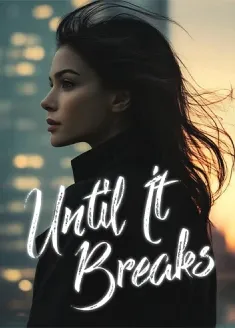
Until It Breaks
- Genre: Billionaire/CEO
- Age: 18+
- Status: Completed
- Language: English
- Author: Selene Ashford
- 2.3KViews
- User Rating 4.6
Chapter 1. First Tremor
The metal door slammed behind her like a warning shot down the narrow stairwell, its echo rattling off every concrete wall until something inside her snapped. Alyssa froze, one hand still curled around the icy railing, her breath caught at the back of her throat. She hated that door with a fierce, aching loathing.
Her other hand trembled around the fraying strap of her canvas bag—the one still damp and warm from the hospital laundry room, the smell of bleach clinging stubbornly to her sleeves. Twelve hours of folding sheets no one would ever thank her for had left her shoulders screaming for relief. But she couldn’t stop here. Not yet.
Outside, Grayville lay wrapped in a silver hush that felt less like peace and more like tension waiting to snap. A thick mist clung to every surface: street signs, satellite dishes, the tangled knot of her hair. The city seemed to hold its breath, pausing between heartbeats, ready to scream the moment someone dared disturb its fragile calm. She tightened her coat against the damp chill, wrestling the zipper past its usual snag halfway up her throat.
She started the climb to the third floor. Each landing, each step of chipped concrete, streaked with rust stains, reminded her how much longer this journey felt these days—physically and in her bones. The stairwell stank of stale cigarette smoke, mold, and something faintly chemical, like nail polish remover mixed with regret. A single flickering bulb overhead buzzed in protest, as if resentful of being forced awake.
At apartment 3B, rows of eviction notices peeled like dead skin from the door. Someone had scrawled “SLUM” in bold Sharpie across the plywood panel. A few doors further down, a crack of someone else’s life showed—blue light from a muted TV screen spilled onto the stained hallway carpet. Conversations faltered in muffled promises, a sitcom laugh track echoing in the gloom.
When Alyssa reached her own mailbox, she paused. The box sat between two others, its metal surface dulled by time and weather. She hated the sound it would make—first the squeal of the hinge, then the soft, accusing rustle of paper inside. She fished out her key and twisted. The flap creaked open reluctantly.
Inside lay the usual: past-due bills, a cartoonish payday-loan flyer of a piggy bank grinning like a psychopath, a greasy pizza coupon with corners stuck together. But beneath the clutter sat something different: a heavy, cream-colored envelope that seemed to hum with purpose. Thick, too-expensive paper—no stamp, no logo, no return address—just one name inked in blocky black marker: Danilo Rein.
Her fingers froze. Her pulse thundered in her ears.
Danilo Rein.
Her father’s name. Not hers.
She glanced over her shoulder. The hallway remained empty, but the silence around her had shifted—as though it, too, had taken a deep breath and braced for what came next. She slid the envelope into her coat pocket without thinking and hurried toward her apartment, every step feeling heavier than the last, her keys jangling in her palm.
Inside, the apartment greeted her like an old enemy. Dim morning light filtered through stained curtains, casting pale stripes across cluttered surfaces. A half-empty beer can teetered on the edge of the kitchen table beside an overflowing ashtray and a plastic lighter warped from overheated use. The radiator coughed but offered no warmth. The air carried the stale perfume of sweat, grease, and old alcohol—the scent of her childhood.
She peeled off her slushy shoes and let her canvas bag fall to the floor with a dull thump. Then she slid into a chair at the table, drawing the envelope from her pocket. In that dim, dusty kitchen, the paper seemed to glow, too pristine to belong.
For what felt like an eternity, Alyssa simply stared at it, her mind racing with scenarios she didn’t want to believe. She didn’t want to touch it. But it had already touched her. Already marked her. Finally, she slid her thumbnail under the flap and tore it open.
Inside was a single sheet of plain white paper, no letterhead, no signature—just three lines typed in a cold, authoritative font:
Final warning. We don’t wait twice. You know what’s owed. You know what happens if it’s not paid.
—T.
Her stomach flipped. Her mouth went dry. She read the words again and again, as if repetition could rearrange their meaning. There was no figure, no date, no dollar amount—just a ruthless threat. Not to him anymore, but to them.
She rose abruptly, the chair screeching against cracked tile as she began to pace. The room felt too small, the air too thin. Her mind jumped ahead to memories she’d buried: the time last year her father stumbled in bleeding, the hooded look in his eyes, the flimsy excuse about “losing at poker.” But this wasn’t an accident. It was deliberate. Hand-delivered. They knew where they lived.
Her phone rattled against the counter. She grabbed it and dialed.
Kira answered on the second ring, her voice warm, gentle, folding around Alyssa like a soft blanket. “Sweetheart?”
“I found a letter,” Alyssa blurted. “It wasn’t mailed. Someone left it here. For Dad.” Her voice caught.
A pause. Then quieter: “Did it say how much?”
“No,” Alyssa managed. “It just said final warning and that they don’t wait twice.”
Kira sighed—a sound heavy with disappointment and grief, like a building creaking on its last foundation. “I told him,” she whispered. “I warned him this would happen if he didn’t stop.”
“I know,” Alyssa said, voice trembling. “But now it’s here.”
“Listen to me,” Kira urged softly. “You need to leave. Today. Pack a bag—get out before it’s too late.”
“I’m not leaving,” Alyssa replied, sharper than she intended.
“You don’t owe him this, Alyssa.”
“I know,” she whispered, her throat tightening. “But I can’t just pretend it’s not happening.”
Another silence.
“You’re stronger than you think,” Kira said finally.
“I don’t feel strong,” Alyssa admitted.
“But you’re still standing,” her aunt insisted. “And that’s enough.”
They hung up, and the heavy quiet returned, settling over the apartment like dust. The letter lay limp in her hand now, as if spent.
A sudden slam of the front door jolted her. She smelled him before she saw him: vodka and sweat, that cheap aftershave he wore to mask everything he wouldn’t admit. He stumbled in, his keys clattering on the tile, shoes scuffing across the floor. He muttered under his breath, his posture all swaggering bravado.
“You open my mail now?” he growled before lifting his eyes to hers.
Alyssa rose, the envelope crumpled in her hand. “What did you do?”
He flung his coat at the wall, missing entirely. “Don’t act like you don’t know what the world costs, girl.”
“It’s a threat, Dad,” she said, her voice rising. “From dangerous people. What did you promise them?”
He turned, slow and deliberate, bloodshot eyes hard and mean. “You think this place pays for itself? Think food shows up out of thin air? I did what I had to.”
“No,” she snapped. “You did what you wanted. That’s all you ever do.”
He stepped forward, nostrils flaring. “You ungrateful little—”
“Don’t,” she cut in, each syllable a blade. “Don’t you dare blame me.”
He paused, a smirk twisting at his lips. “There’s a way out,” he said low, conspiratorial. “Some big shot with cash. He can make the debt disappear. All he wants is… a little commitment from you.”
Her heart stalled. “You want to sell me off?” she whispered.
“Think of it as repayment,” he muttered, already fishing a beer from the fridge. He popped it open with a practiced flick. “You owe me.”
She stumbled back as though struck. Maybe he’d slapped her already.
That night, sleep eluded her. She crept back up the narrow staircase to the roof, each metal step cold against her boots, the wind tugging at her coat like it, too, wanted her gone. Above her, the sky was black velvet. Below, Grayville pulsed with dim streetlamps and flickering neon, a wounded giant still fighting to breathe.
She walked to the rusted railing, the letter heavy in her coat pocket. Below, the city throbbed with distant traffic, late-night laughter, honking horns—life going on as if she and her nightmares didn’t exist.
She thought of her mother’s hands, how they had danced across a sketchbook in bright, certain strokes—crayons bringing imaginary cities to life, promise in every color.
She closed her eyes and whispered into the wind, “I’ll sell my freedom if that’s what it takes to get out.”
A gust answered her, tugging at the edges of her coat. She opened her eyes, staring out at the endless sprawl of Grayville, every broken lamp and graffiti-stained wall.
“But one day,” she vowed, voice steadying, “I’ll buy it back.”









